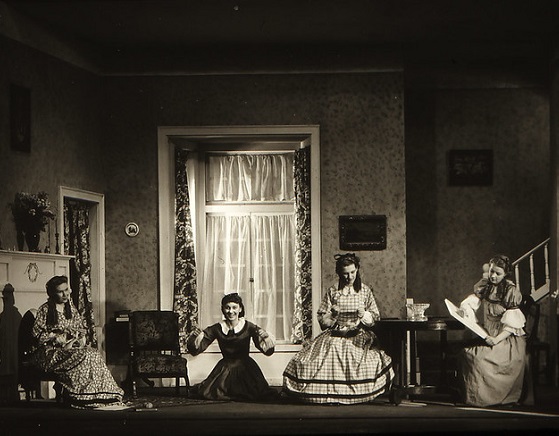I Choose Not to Identify With Any of the ‘Little Women’.

{source}
The first time I read Little Women, I was little. In elementary school. I remember liking the story and trying to decide which March sister I was.
I wasn’t a tomboy, so I couldn’t be Jo, or so I thought at the time. But Jo wrote stories and so did I, and she performed plays in her attic room with her sisters, as did I with my own sisters in our semi-finished basement in Brooklyn. I played piano like Beth, and was equally shy. I would also play house and school with my sisters and pretend to be married to one of the Beatles, so I related to Meg.
Amy was the only one I didn’t have anything in common with. I wasn’t a clingy brat, and I don’t think I was ever facetious or destructive. I can’t imagine burning my sister’s novel or vice versa, no matter how annoyed I was with her.
But in her defense, it wasn’t easy for Amy to be the youngest sister, left behind while the others went to balls, even though Jo would rather not get all fancied up and Amy loved everything frilly and romantic. Jo forgives Amy her transgressions, even falling for her Laurie.
While my heart broke for Jo, I understood her selfless love for her sister. Besides, she had books to write, and let’s face it, marriage and children can cause one to lose focus, especially women. What is expected of us has always been more than men. That hasn’t changed even in this century. And then there’s Marmee.
We had Mommy. She was as nice and nurturing as Marmee, doing good deeds for neighbors and family, bringing food to sick friends and providing a sounding board for her women friends around our kitchen table with endless cups of coffee and her delicious home-baked cakes. Mommy could stretch a dollar, cooking meatless meals and getting creative with leftovers.
We were not poor, nor were we well-off. I passed my clothes down to the next sister and Mommy sewed us dresses and jumpers. Mommy wasn’t politically active, though she had opinions, expressed in her very ladylike way, never raising her voice.
Early on, I thought her life was mostly happy as she was such a sunny person. Later she would admit she had her dark days. She might not have been “angry every day of my life,” as Marmee admitted, but she didn’t deny life was not always a piece of cake. Especially marriage.
Father, in our case, was not around much. He wasn’t fighting in the Civil War as Mr. March, he was working his police job, and when he was home he wasn’t exactly available emotionally. I didn’t have an Aunt March, I had an Aunt Virginia who took me on trips, and Aunt Anne who thought I was smart and creative. Our Laurie was two people, my country cousins, Cubby and Chris.
When we visited Vermont for the summer, we were as wild as we could be in nature, for city girls, running barefoot, chasing fireflies by the old barn and climbing salt piles. There was for a time no distinction between the sexes in my mind, or at least no pressure to act in a certain way. We were all just kids having fun.
That would of course change when we became women, something charged hanging in the air. Perhaps the unspoken message that men did whatever they wanted and women had parameters.
I had no idea when I read Alcott the first time what obstacles she was up against in the literary world alone. Like not being published unless she wrote happily married endings for women, for one. Being paid poorly because of her sex, for another. I would later applaud her for insisting she keep her copyright. How daring. I would keep that in mind when my publishing debut arrived.
I married for love like Meg and lived a traditional marriage of my own choosing, yet I sincerely believed there was no shame in staying home tending to children and writing without a paycheck. Ancient scribes and philosophers were revered for doing the same. But they were men. It was only when I would attend parties that I would be dismissed when I said I stayed home and mothered and wrote stories.
I thought it was romantic and worthy since writing is never easy no matter where you do it, in a city room of a newspaper or a kitchen table with children underfoot. But the world didn’t believe that. I would lose heart at times, like Jo, and become angry about the unfairness of it all. But, like Jo, I wouldn’t stop writing for long, and I too ultimately realized, we are who we are.
Trying to fit into someone’s else’s boots or petticoats is a lost cause, and it is not going to make us happy in the end.
I would read Little Women again, while taking an Independent Study course called Women Writers of the Nineteenth Century. I was in my thirties, and my reading of the same novel affected me quite differently. I had already read Gail Sheehey’s Passages. How women moved through their lives in the twentieth century still had a long way to go, as far as equality in pay and validation for “women’s work.”
By this time, I decided I didn’t need to choose which March sister I identified with. I could be all of them or none. I was not Marmee either, though I related to her everyday silent anger, though mine was not so silent. It would be a fight for me in my marriage for independence, and validation as a writer in the world.
Things have changed in publishing thankfully, yet male voices still lead the bestseller lists and female authors use male pen names sometimes. I dream of a world, like Jo did, where that is not necessary any more.
***
 Nanci LaGarenne is a former freelance journalist for Dan’s Papers. She writes for The Montauk Sun and Rebelle Society. Born and raised in Brooklyn, she moved to the woods of Long Island’s East End, 30 years ago. She is a former teaching assistant with autistic children at PS 236 and former staff of The Retreat, a domestic violence shelter in East Hampton. She self-published a novel about her experience there, called Refuge. Inspiration from her job as a karaoke host in a fishermen’s bar in Montauk for 12 years led her to write a murder mystery novel about a floating brothel, called Cheap Fish, also self-published. She is currently pitching her new novel set in Oakland, California, to agents.
Nanci LaGarenne is a former freelance journalist for Dan’s Papers. She writes for The Montauk Sun and Rebelle Society. Born and raised in Brooklyn, she moved to the woods of Long Island’s East End, 30 years ago. She is a former teaching assistant with autistic children at PS 236 and former staff of The Retreat, a domestic violence shelter in East Hampton. She self-published a novel about her experience there, called Refuge. Inspiration from her job as a karaoke host in a fishermen’s bar in Montauk for 12 years led her to write a murder mystery novel about a floating brothel, called Cheap Fish, also self-published. She is currently pitching her new novel set in Oakland, California, to agents.

